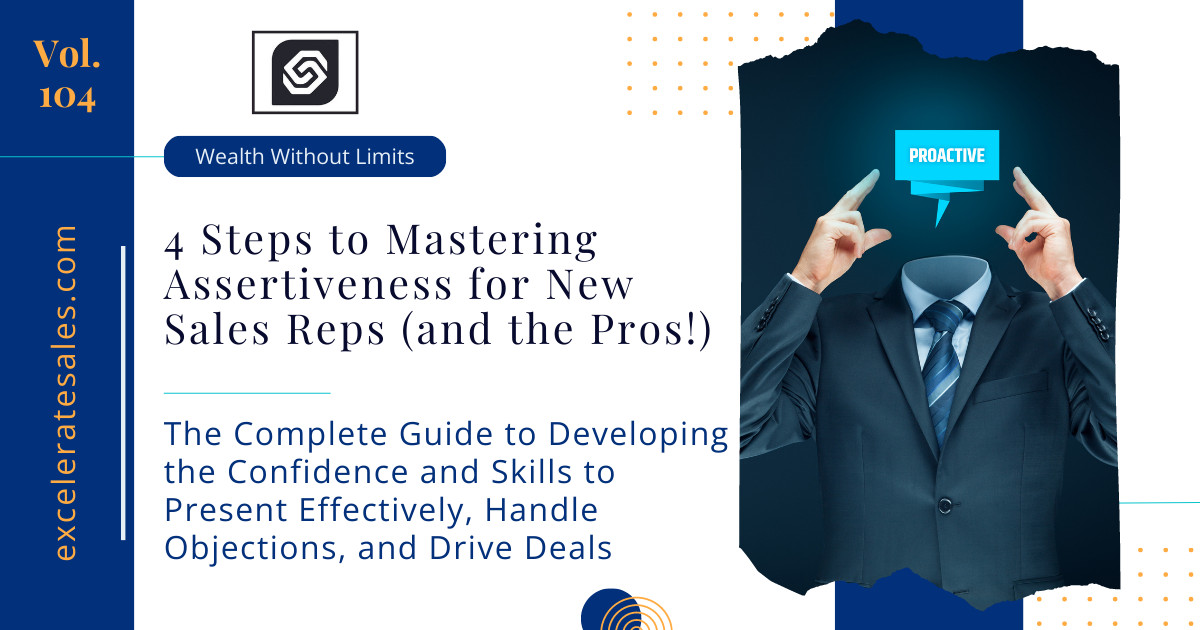
How to Ask the Right Questions to Build Rapport, Gain Insights, and Close More Deals
After more than two decades in sales, I have witnessed first-hand how self-doubt, fear of rejection, and a lack of skills can hinder the growth of new sales representatives.
Overcoming these obstacles requires a comprehensive approach, and one of the most powerful tools in a sales rep's arsenal is the art of questioning.
Although this blog post will explore how specific, thoughtful, and strategic questioning throughout the sales process will build value and trust, ultimately leading to greater success, there are a couple of key points to remember.
In addition to asking strategic questions, it's also important to ask general questions to get to know the customer and their needs. This will also help you to build rapport and be more relatable to the customer and create a more personalized sales experience.
Some examples of general questions that you can ask include:
- What are your biggest challenges right now?
- What are you looking for in a new product or service?
- How much are you currently spending on your current product or service?
- When do you need to make a decision about your next purchase?
Just as important to bear in mind is that this is by no means a “carved-in-stone” approach. The sales process can be, and in most cases probably should be a fluid process.
And PLEASE, do not ask all of these questions in order and with the same prospect. At best, you will sound like a terrible sales robot. Worst case, your prospect shows you to the door to go away and think about what just happened.
Instead, use this as a guide and a foundation. Commit these questions to memory through repetition and roleplay with your sales manager, other sales reps, or a coach/mentor so you have them when you need them.
Let’s get to it, shall we!?
Establishing Rapport, Trust & Credibility
To truly establish value during a sales conversation, it is imperative to go beyond surface-level questions that just elicit a simple yes or no response. By asking thought-provoking questions, you can engage your prospect in a meaningful conversation that showcases your genuine interest in their business and demonstrates your active listening skills.
When crafting these thought-provoking questions, put yourself in your prospect's shoes and consider their unique challenges and goals. Show empathy towards their situation and actively listen to their responses to gain a deeper understanding of their needs.
This approach allows you to uncover valuable insights that will help tailor your solution to their specific pain points.
For example, instead of asking a generic question like, “How can I help you today?” or "Do you need help with your marketing strategy?" try a more specific and thought-provoking approach.
Here are five example questions that engage the prospect while creating a sense of value while establishing rapport, trust, and credibility:
- "What inspired you to start your business, and where do you see it heading in the next few years? I'm eager to learn about your vision and how I can help you achieve it."
- "How do you envision implementing new strategies to stay ahead of your competition? I'd like to explore innovative opportunities that align with your goals."
- "What are your key objectives for this quarter, and what steps have you taken towards accomplishing them so far? I'm curious to know how I can support your progress."
- "What kind of impact would overcoming your current challenges have on your business? I'd like to understand the potential growth opportunities that lie ahead and how we can realize them together."
- "Can you tell me more about your business's biggest obstacle and how it affects your overall goals? I'd love to understand the specific struggles (pain points) you're facing."
These questions not only show that you are interested in their business but also encourage them to discuss their pain points in detail. By actively listening and empathizing, you can then provide targeted solutions that directly address their concerns, establishing your value as a problem solver.
Remember, the goal of thought-provoking questions is to stimulate meaningful conversations and uncover opportunities that may not have been apparent before.
By engaging prospects with genuine curiosity, active listening, and empathy, you can establish yourself as a trusted advisor who truly understands their needs and can provide valuable solutions.
Now that we have established some trust, it’s time to find out if this prospect is a good fit for your product or service.
Qualify or DisQualify – Which is more important?
Qualifying the prospect is a crucial step in any sales process, and utilizing open-ended questions can greatly enhance this process.
Not only does this step benefit you as the sales rep by ensuring you are focusing your efforts on the right prospects, but it also adds value to your prospect. By taking the time to listen and understand their unique situation, you demonstrate a genuine interest in their success and become a trusted advisor rather than a pushy salesperson.
By qualifying or disqualifying prospects early on using open-ended questions, you save both your and your prospect's time. This approach prevents you from wasting time on leads that do not align with your product or service or simply do not have the budget. Conversely, it ensures that you are dedicating your resources to prospects who have a genuine need and the means to invest in a solution.
Here are five examples of questions to use in determining whether your prospect is qualified or not:
- Would you mind sharing your thoughts on how you envision product X serving your organization?
- Typically similar clients I have worked with in the past have already met with the finance team to establish a budget for something of this scale. Would you mind sharing in “round numbers” what you have allocated in your budget for this project? I don’t need exact figures here; just a ballpark is fine for now.
- Knowing time is always of the essence, what is your timeline for implementing/purchasing this type of product or service? Do you have any deadlines ahead that we need to be aware of?
- Typically at this stage of the conversation, our clients have several questions in mind for us. In addition to these, what concerns do you have so far?
- Where do you see us going from here? What do you see as the indicated right step?
When you focus on serving your prospect by helping them find the most appropriate solution for their needs, you establish a strong foundation of trust. Your prospect will appreciate your genuine interest in their success, and this positive experience will reinforce their perception of you and your company.
Furthermore, by providing tremendous value through your guidance, you increase the chances of them returning to you when they do have a need in alignment with your product or service. They will remember the exceptional service they received, the personalized attention, and the fact that you prioritized their needs over making a quick sale.
This level of service will set you apart from competitors who may have tried to force them into buying something they did not need or were not ready for.
Now that we know both sides of qualifying and disqualifying prospects through open-ended questions, which do you believe is most important?
Let us know in the comments! I will share my answer in the comments as well.
Differentiating Perceived Needs from Actual Needs
Perceived needs are often based on initial assumptions or preconceived notions about a solution. They may not even address the underlying pain points that hinder your prospects' progress.
When it comes to successful sales outcomes, understanding the prospect's true challenges and needs is paramount. Incorporating strategic and probing questioning in this next phase allows you to uncover these crucial insights.
Utilize the following techniques To uncover valid pain points and actual needs:
Ask More Open-Ended Questions:
- Similar to the thought-provoking questions used in Establishing Trust and Rapport, we want to avoid asking generic yes/no questions.
- We will use open-ended questions whenever possible to encourage prospects to elaborate on their challenges.
- These open-ended questions allow your prospect to express themselves freely, leading to a deeper understanding of their true pain points.
Practice Active Listening:
- Pay close attention to what your prospects say as they respond to your questions and during conversations.
- Listen not only to the words they use but also to the emotions behind them. This will help you identify inconsistencies or gaps between their perceived needs and underlying pain points.
- If you are taking notes, just jot down the key points to come back to those later as needed.
Here are five examples of probing questions to use to help uncover and diagnose the hidden or root causes leading to their current struggles:
- Can you tell me more about the specific challenges you are currently facing in your business/industry?
- What impact do these challenges have on your day-to-day operations or long-term goals?
- Have you tried any solutions before? If so, what worked and what didn't?
- What are the consequences of not addressing these challenges?
- What would success look like for you in terms of overcoming these pain points?
Explore the "Why" Behind Their Needs:
- When prospects mention a particular need or desire, don't stop there.
- With each probing question you ask, follow up with another open-ended question.
- Continue this at least 2-3 times.
- Each time you are peeling back the layers digging deeper as you uncover the real challenges driving a need for change.
Here are some examples to designed to get to the root cause:
- Why is this important to you?
- What problem would this solve for you?
- Thank you for sharing this, can you tell me a bit more about that?
- What does that mean, can you give me an example?
Using the strategic questioning outlined above will shed light on the actual challenges driving your prospect's perceived needs. You will start to understand the underlying motivations and begin positioning yourself as the trusted advisor, helping your prospect to uncover their true challenges “on their own.”
Implementing These Questions Strategically:
Done right, incorporating thoughtful and strategic questioning techniques throughout the sales process will greatly improve your success. Furthermore, Just as important as the questions themselves is the intention and strategic direction behind them.
Used in the wrong order or with the wrong intention can and most likely will only lead to frustration, both for you and your prospect, ultimately costing you the sale and possibly your reputation.
To avoid these potential pitfalls, consider these best practices to guide you along your sales process:
- Timing is Key:
- Choose the appropriate moment to ask probing questions.
- Avoid bombarding prospects with them in the early stages of the conversation.
- Wait until they have shared their initial pain points voluntarily or expressed their interest in exploring potential solutions.
- Be Genuine and Curious:
- Frame your probing questions in a genuine and curious manner.
- Always demonstrate a sincere interest in understanding their challenges.
- Maintain a consultative tone throughout the sales process to eliminate any perception of being pushy or salesy.
- When asking probing questions Focus on the Impact:
- Emphasize the impact of the prospect's challenges on their: goals, objectives, or overall well-being.
- Review the consequences of these challenges if left unresolved.
- Help them to recognize the importance of finding a solution that addresses their actual needs.
By asking thought-provoking questions, you are building trust from the start and uncovering the actual challenges and needs throughout the sales process. As your prospect's trust in You increases, so does your credibility.
Following the steps outlined above, you are continually building up your prospect's sense of the value in you as an expert and professional. The added value further positions you to effectively tailor customized solutions that meet the prospects' specific needs, empowering them with the information needed to make the decision to buy from you!
By mastering the art of questioning, not only will you be more likely to win over your prospect and get the sale. You are also building up your own internal value, strengthening your beliefs, overcoming self-doubt, and the fear of rejection, as you increase your skills, ultimately paving the way for your professional growth and success.
Always be intentional with your questions, demonstrate genuine interest, and actively listen to the prospect's responses. Implementing these questioning strategies will not only empower you to build stronger relationships with prospects but also enable you to provide tailored solutions that address their specific pain points.
Embrace the power of questions and unleash your true sales potential!
Unlock Your Sales Potential! 🚀 Join our exclusive Personal and Professional Development Mastermind tailored for ambitious sales professionals like you.
Dive deep, strategize, and elevate your sales game to unparalleled heights. Don't just be good—be the best. 🔥
Do you find this blog helpful?
You can help us out by leaving a comment below or simply sharing it with other sales pros to help spread the word.
Do you have a question or topic you would like covered?
Let me know, and I will add it to the list!
Ready to take control of your life and career?
Here are a few ways I can help! Follow the links below to learn more!
- Follow me on LinkedIn -- never miss out on future tips, techniques, and tactics for outperforming the competition
- Download your free guide -- 7 Daily Habits of High-Performance Sales Leaders
- Subscribe to our monthly Leadership Newsletter or our new Personal Development Newsletter
- each month, we will send you fresh ideas, tips, and lessons across all areas of life and career.
- Schedule a Discovery Call to learn how our personalized coaching and training programs can boost your sales and rake in higher commissions
Success starts with taking action. Choose the options that resonate best with you, and Get Started Today!

















0 Comments